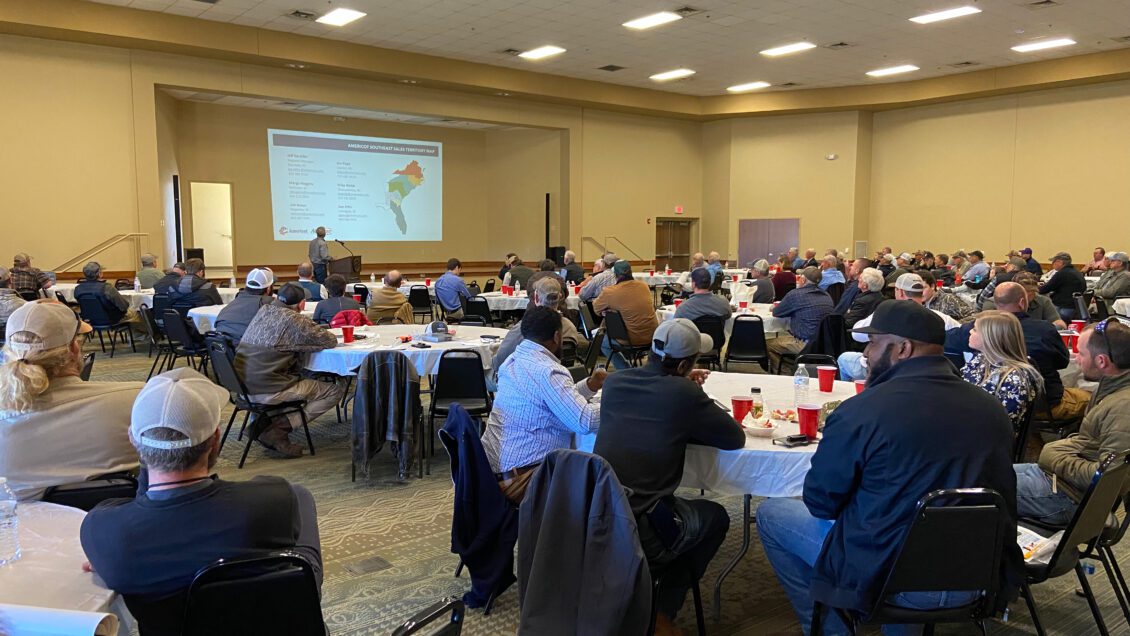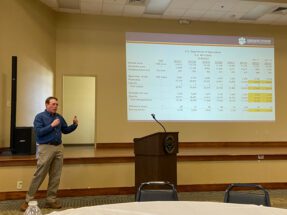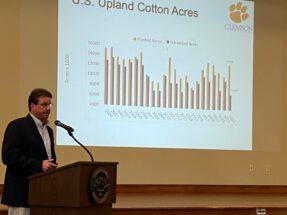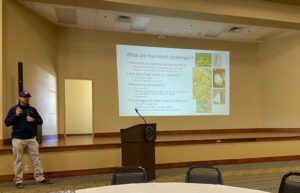
During the 2023 South Carolina Cotton Growers Meeting, cotton growers were told they should expect the possibility of lower prices this year.
Nathan Smith, Clemson Extension agricultural economist and agribusiness program team director, said the outlook for cotton shows a slow economy and reduced demand coupled with a carryover increase pushing cotton acreage to an expected 11.57 million acres according to a Cotton Grower survey, down roughly 1 million acres from 2022. However, the drop could be larger falling below 11 million acres.

All of this is expected to hold down prices, Smith told about 200 South Carolina cotton growers during the meeting in Santee, South Carolina in January. December cotton futures prices were $0.87 on Jan. 24, 2023, compared to $1.24 at the same time in 2022.
“The U.S. cotton supply is high and demand is down,” Smith said. “We have a surplus of cotton left over from 2022 and consumers have cut back on discretionary spending, like buying clothes and other cotton goods, in favor of paying for food and fuel, transportation and housing. This has pushed down cotton prices and we may see some cotton acres shift over to another crop.”
Smith said budgets will be important going into the planting season.
“Growers need to know what price they will need to cover all of their costs and still have a profit to for living expenses and other expenses on the farm,” Smith said. “So budgeting is important this year. Growers have already cut back on what they can on their inputs due to the, the supply situation last year and the higher prices.”
There is one bright spot on the input side. Smith said fertilizer prices have started coming down and are a little lower than they were this time last year. Prices for diesel also are dropping.
“Right now, this looks like it’s going to be a year where growers will need to continue to be as efficient as they can be,” Smith said. “Hopefully, we’ll be blessed with good weather so that we can have a good crop for South Carolina cotton growers.”
Cotton varieties and seed testing
Mike Jones, Clemson Extension cotton specialist at the Pee Dee REC near Florence, South Carolina, said 2022 was a record year for southeastern United States cotton with an average 939 pounds per acre harvested. Fiber quality is important and proper selection can ensure cotton growers grow profitable varieties.
“U.S. cotton is outstanding in fiber length and strength,” Jones said. “To continue growing high quality cotton, growers should do their homework when choosing varieties to plant. Variety selection is one of the most important decisions a cotton grower can make. Choose varieties that have yield potential in various areas.”

It is important to spread risks over planting and maturity dates. Varieties that have performed well in the Southeast and in South Carolina include Stoneville’s ST 5091B3XF and Delta Pine’s DP 2127B3XF, DP 1646B2XF and DP 2012B3XF, Americot’s NG 4190B3XF and Armor’s 9371B3XF. More variety trial information from Jones’ studies can be found online at http://bit.ly/3DAIRqe.
New varieties are coming for the Southeast. Industry representatives from BASF, Americot, Bayer Crop Science and Phytogen spoke briefly about new cotton varieties coming from their companies.
When deciding which variety to plant, Jones said “purchase quality seed.” Clemson Regulatory Services operates the South Carolina Seed Certification Program in which seed producers adhere to rigid standards for purity and germination based on laboratory analyses conducted by the S.C. Department of Agriculture Seed Lab.
Leslie Beaty from the Agriculture Seed Lab said germination and purity testing are conducted in the lab. South Carolina Seed Law requires seed to be tested and meet specific standards before it can be sold, Beaty said. The law also requires anyone selling seed in South Carolina be licensed through SCDA Consumer Protection Division. Information regarding the sale of seed can be found in the South Carolina Seed Law. An application for sale of seed can be found at South Carolina Seed License Application.
Insect pests
As for insects, Jeremy Greene, Clemson entomologist housed the Edisto REC, said the issues are the same but growers now have new control strategies. Greene talked about preventative and reactive options for thrips in cotton, including seed and in-furrow treatments. Another option is Bollgard 3 ThryvOn cotton. After a successful trial program, Bollgard 3 ThryvOn cotton with XtendFlex technology is now available. Thryvon is the industry’s first biotech trait to provide protection against tarnished plant bugs and thrips species. It also may help reduce the need for some insecticide applications.

For insect management recommendations, go to the 2022 South Carolina Pest Management Handbook, https://bit.ly/3DDlOLA, or contact Greene at greene4@clemson.edu.
In a boll weevil update, Drake Perrow of the state’s Boll Weevil Eradication Program said this pest has not been detected in the state for some time.
“We want to keep boll weevils out of South Carolina,” Perrow said. “One way to help keep them out is for growers to inspect every piece of equipment they buy from somewhere else to make sure it’s clean and free of any boll weevils.”
Keeping agriculture Number 1 in South Carolina

Agriculture is the state’s Number 1 industry and cotton is one of the top commodities contributing to agriculture’s $51.8 billion annual impact on the South Carolina economy. Commissioner of Agriculture Hugh Weathers told attendees his department is working to keep agriculture strong in South Carolina.
“These last couple of years have been strong for South Carolina cotton,” Weathers said. “Our agritourism industry is growing and we’re helping meat, poultry and seafood processors expand and keep more dollars in the state. We’re also looking for projects that will add to production agriculture in our state. It’s a good time in South Carolina for agriculture.”
Technology, sustainability and the farm bill
Technology use is important to help keep agriculture sustainable. Ed Barnes, senior director of agriculture research at Cotton Incorporated, encouraged growers to use technology to grow their crops. One example of this technology is the “Husky Harvester,” a modified Husky robot made into an autonomous utility tractor with the ability to navigate fields while pulling smart implements behind it. This technology was created by a team led by Joe Mari Maja, a Clemson research sensor engineer housed at the Edisto REC.
“Technology allows for more precise crop management,” Barnes said. “At Cotton Incorporated, we are focusing on research using robotics and AI-controlled (Artificial Intelligence) machines to improve harvest yields and pest management precision. We believe this technology will allow crops to be farmed and harvested more efficiently, and more sustainably.”
Sustainability is important. In a report from the National Cotton Council, chairman Ted Schneider said to remain viable, cotton producers should focus on sustainability.
“I believe as long as we meet the needs of our customers, cotton has a bright future, but the needs of our customers are changing,” Schneider said. “We are in a supply chain of a very large industry. Brands and retailers, spinning mills really like U.S. cotton, but they need sustainable cotton — more accurately they need proof we’re growing cotton sustainably.”
Schneider said the Cotton Council is “working hard in Washington D.C. to protect America’s farmers and be sure we can get the best bang for our buck from the new farm bill.”
In addition to these presenters, other speakers during the meeting were Frank Rogers, chairman of the South Carolina Cotton Board and Todd Campbell, USDA-ARS research geneticist.
-END-
Get in touch and we will connect you with the author or another expert.
Or email us at news@clemson.edu
